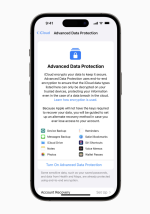Apple announced on Wednesday its plans to expand end-to-end encryption of iCloud data, covering backups, photos, notes, chat histories, and other services. This move is aimed at enhancing user data security but may escalate tensions with law enforcement globally.
One of the key new security features is Advanced Data Protection, allowing users to secure specific data from hackers, governments, and spies, even in the event of an Apple data breach. This includes data inaccessible to Apple itself, ensuring that even with a warrant, law enforcement cannot access it. With end-to-end encryption, only the sender and recipient have access to the data, not even the platform.
As a consequence, Apple would be unable to comply with requests to share such encrypted cloud-stored data as part of investigations, continuing its stance from previous clashes with law enforcement over data access, such as the San Bernardino case in 2015.
In recent years, Apple has increasingly emphasized privacy as a core value, introducing new tools to protect journalists and human rights workers from spyware. The company positions this latest move as part of its ongoing efforts against evolving threats to user data from malicious actors and the rise in data breaches.
Privacy advocates have long urged Apple to enhance iCloud backup encryption. Craig Federighi, Apple’s senior vice president of software engineering, noted that the company’s past efforts in designing iCloud laid the groundwork for this advancement.
Currently, iCloud already encrypts 14 sensitive data categories by default, including iCloud Keychain passwords and Health data, with nine more categories to be added. However, encryption for iCloud Mail, Contacts, and Calendar faces interoperability challenges and is not included in the new encryption rollout.
Matthew Green, a cryptographer at Johns Hopkins Information Security Institute, believes Apple’s move will set a standard for consumer cloud backup security, potentially influencing the industry.
The FBI, in response, expressed ongoing concerns about the impact of end-to-end encryption on law enforcement’s ability to combat crime, from cyber-attacks to terrorism, citing the challenge it poses to public safety and justice administration.


